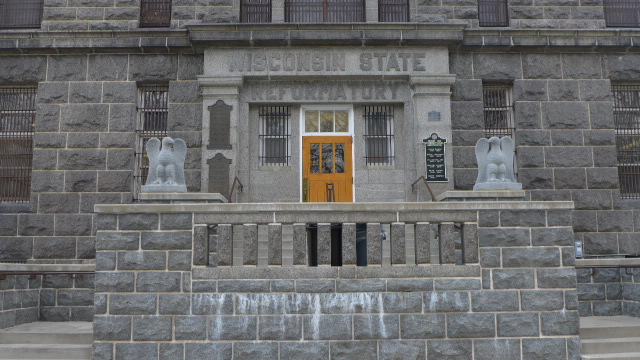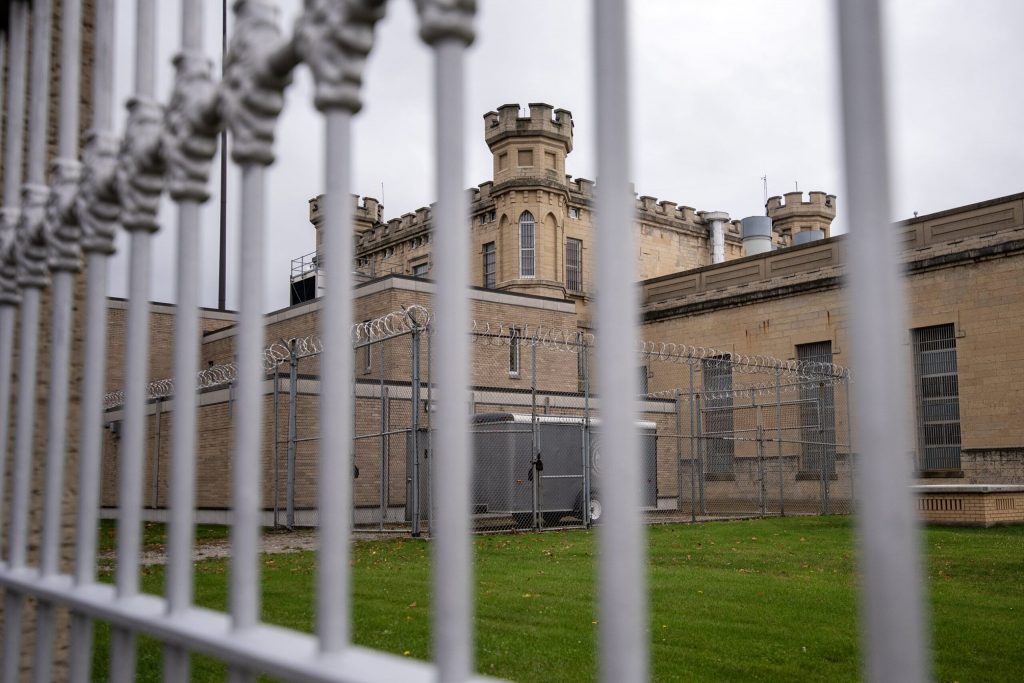Evers’ Prison Plan Receives Mixed Reviews
Lawmakers divided on $500 million plan, but local officials, advocacy groups like it.
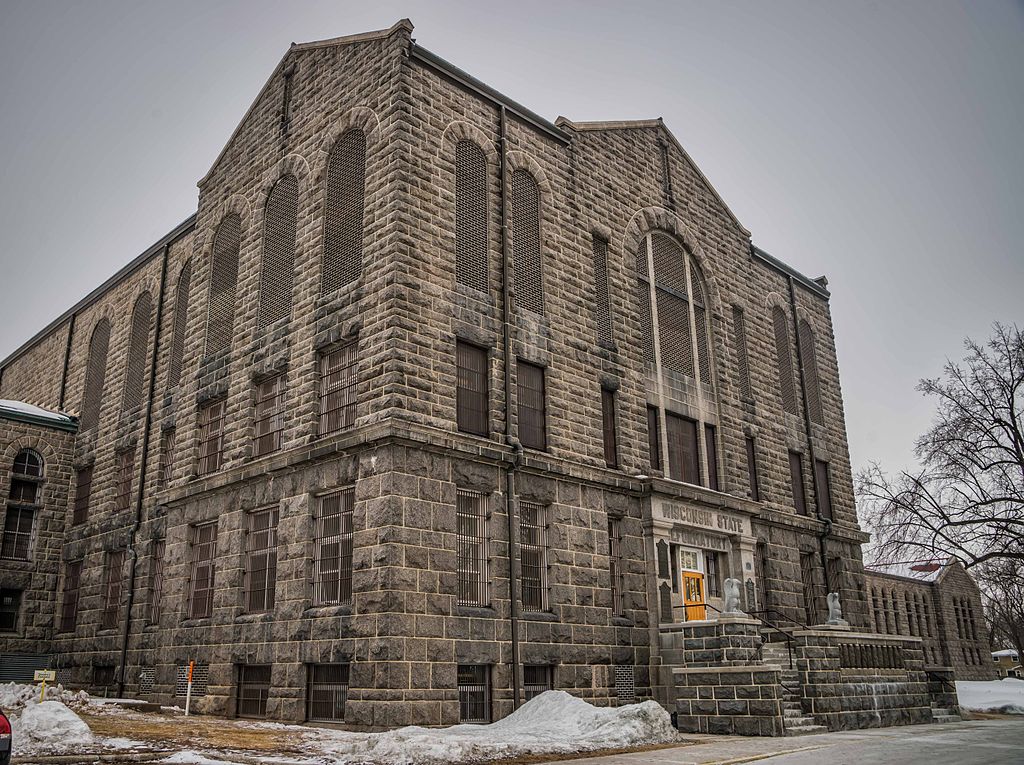
The Green Bay Correctional Institution in Allouez, built in the 1890s, is Wisconsin’s second-oldest state prison. Rauglothgor/Wikimedia Commons
Democratic Gov. Tony Evers will ultimately need approval from Wisconsin’s Republican-controlled Legislature if he wants to make his half-billion dollar plan to reorganize Wisconsin’s prison system a reality.
So far, the governor’s recently released budget request for Wisconsin’s Department of Corrections is getting mixed reviews from state lawmakers, although criminal justice reform advocates and several local officials say they’re encouraged by the proposal.
Evers proposal would close one prison near Green Bay, convert other institutions
Under Evers’ plan, Wisconsin’s maximum security Green Bay Correctional Institution would eventually be shut down, and the hundreds of men locked up there would be shuffled to other institutions.
That would be made possible by what officials called a “domino” series of changes to other prisons, including converting Wisconsin’s Stanley Correctional Institution, which is currently medium security, into a maximum security lock-up with the flexibility to house medium security inmates as well.
A troubled youth prison complex, known as the Lincoln Hills School for Boys and Copper Lake School for Girls, would eventually be converted into a 500-bed medium security for adult men.
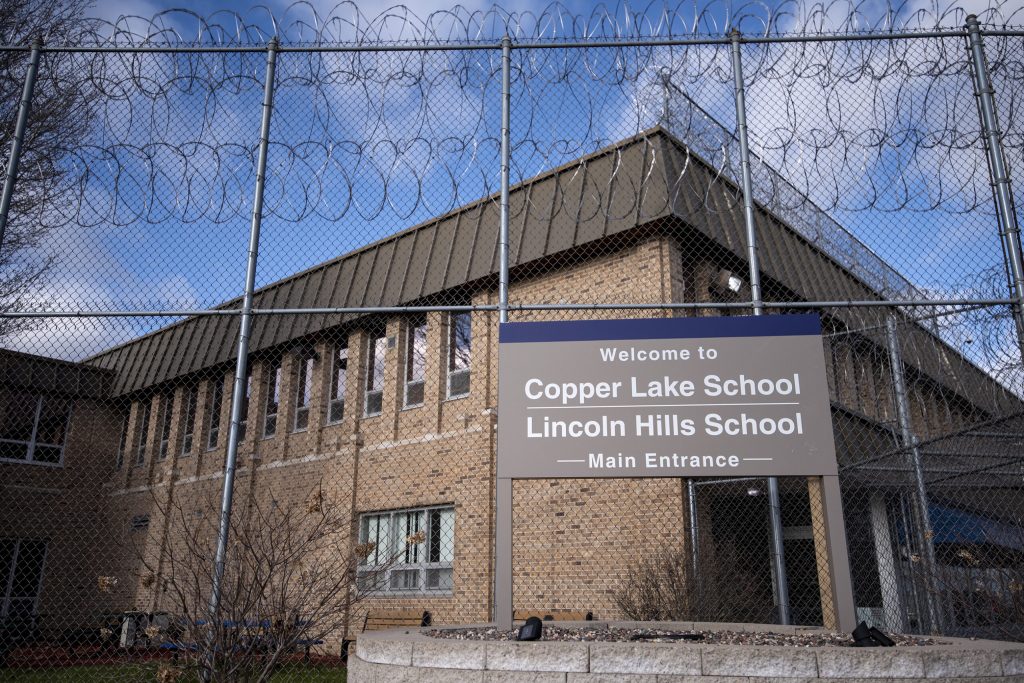
A fence surrounds Wisconsin’s Lincoln Hills youth prison Thursday, April 15, 2021, in Irma, Wis. Angela Major/WPR
And Evers’ plans calls for changing the maximum security Waupun Correctional Institution into a medium security lock-up that focuses on job training for the men incarcerated there.
In all, the $535 million reorganization would reduce the capacity of Wisconsin’s prison system by about 700 people.
Evers has also called for expanding the capacity of an earned release program, which allows some non-violent offenders who are near the end of their sentence secure their release after completing substance abuse treatment.
Top Republican says expansion of early release is a nonstarter
But Assembly Speaker Robin Vos, the Legislature’s top Republican, blasted Evers’ proposal to expand earned release.
Under Wisconsin law, earned release is available to some people who were incarcerated after post-2000 changes to Wisconsin’s sentencing procedures, known as “truth in sentencing.” Judges have to approve someone’s eligibility for the program, and it’s only available to non-violent offenders with a documented substance abuse disorder.
There’s currently a waitlist for earned release participation, but Evers’ proposal would allow the program to admit a larger number of people, while also making job and educational training available to participants. Evers’ office says participation requirements set in Wisconsin law, such as those excluding people with violent offenses, would remain unchanged.
Dennis Franklin, an organizer with the group Ex-Incarcerated People Organizing of Wisconsin, says Evers’ budget request is a positive, if incremental, step. But Franklin argues the state needs to do much more increase availability of earned release and other job readiness programming.
“One thing we know for a fact is that 95 percent of people who are incarcerated will be released,” said Franklin, who previously spent time incarcerated in Wisconsin. “And I guess the most important question is: How do you want individuals returning to the community?”
Criminal justice reform advocates ‘cautiously optimistic’
That’s a sentiment echoed by Rebecca Aubart, who leads Ladies of SCI, also known as the Ladies of Stanley Correctional Institution.
“It is earned release,” Aubart said. “It’s not just opening the doors and letting people out.”
Aubart says she’s “cautiously optimistic” about the governor’s proposal, though she acknowledged it’s likely to face difficulty clearing the state Legislature.
“While we are very encouraged to see the governor not give up and even put more stuff in the spreadsheet for corrections, realistically, it’s up to our lawmakers,” she said.
Still, Aubart said Evers’ plan doesn’t go far enough to reduce Wisconsin’s incarcerated population.
“If we don’t ease up on some of our sentencing guidelines, we’re going to still pack the prisons,” Aubart said.
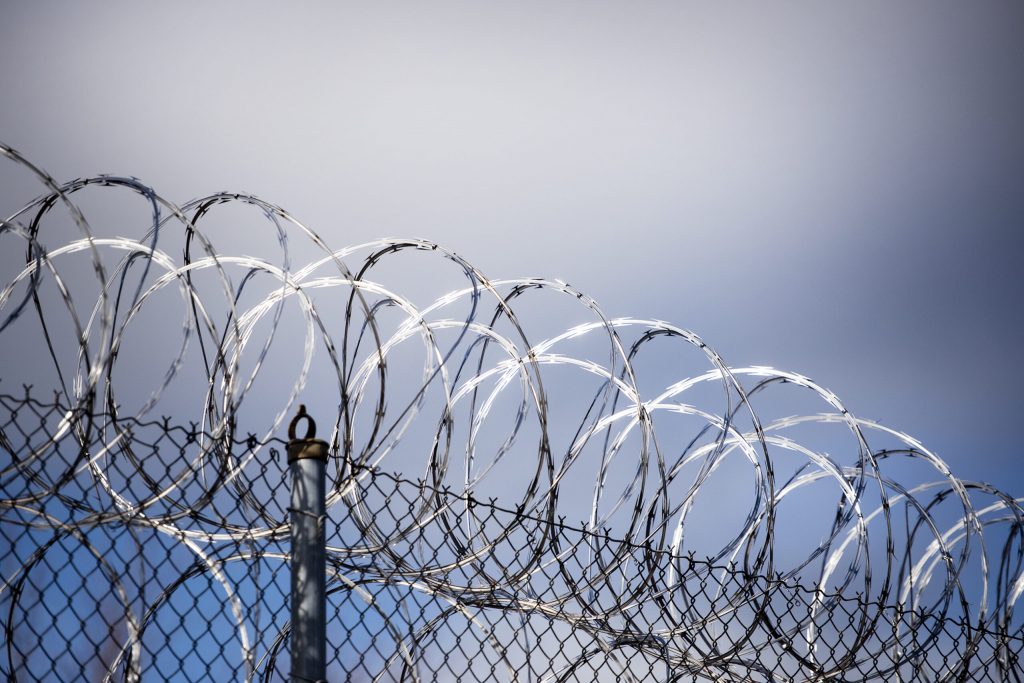
Sunlight reflects off of barbed wire that sits atop the fencing surrounding Lincoln Hills youth prison Thursday, April 15, 2021, in Irma, Wis. Angela Major/WPR
Wisconsin’s prison population has more than tripled since 1990. Currently, there are more than 23,000 adults locked up in Wisconsin’s prisons. which makes the system over-capacity by about 5,000 people compared to what it was designed for.
Another Wisconsin-based criminal justice reform group, known as WISDOM, characterized Evers’ budget proposal as a welcome move.
“WISDOM believes many more steps must be taken to decrease the prison population, and that more prisons must be closed, but is very pleased to see this concrete and important first step,” the group said in a statement.
Green Bay-area officials seem receptive to plan for facility’s closure
A bipartisan coalition of state and local leaders has long been pushing for the state to shut down Green Bay Correctional Institution, and multiple officials from the Green Bay region have so far been receptive to the governor’s announcement.
Among them is state Rep. David Steffen, R-Howard, who has described the Green Bay Correctional Institution’s “deplorable” state as a product of decades of neglect.
Reports have detailed numerous problems at the 127-year-old maximum-security facility near Green Bay in Allouez, including outdated security infrastructure, faulty plumbing and noncompliance with the Americans with Disabilities Act.
“For eight years, I have been communicating the unsafe, unsustainable reality of GBCI,” said Steffen, whose district includes the Green Bay prison, in a press release. “While leadership and decision-making delays have increased the risk, cost and complexity of a solution, we are finally in a position to work together and move forward. It is certain that Governor Evers’ proposal will require modifications to meet certain public safety needs; however, his efforts are a promising, positive first step toward the necessary and final closure of GBCI.”
Jim Rafter, Allouez’s village president, took a similar tone, expressing support for Evers’ proposal.
It’s not yet clear what would happen to the massive property that houses the Green Bay prison if the facility does eventually shut down. But local officials have previously floated plans to redevelop that area of land near the Fox River and the Packers’ Lambeau Field with housing, businesses and park space.
Evers says staff who worked at Green Bay would be reassigned elsewhere in Wisconsin’s prison system without needing to apply for new positions. He’s also calling for the expansion of another prison in that region of northeast Wisconsin, by spending $56 million to add 200 beds to the minimum security Sanger B. Powers Facility in Brown County.
Waupun mayor relieved plan would keep facility open
Further south, the mayor of another prison community says he’s relieved that Evers’ plan will keep Waupun’s prison open.
For years, advocates have been calling on the state to close that facility. Parts of the prison were built before the Civil War, and it’s been plagued by scandals including inmate deaths and drug smuggling by staff.
But Waupun Mayor Rohn Bishop says closing the prison would be economically devastating. Waupun Correctional Institution is one of three prisons in the city of some 11,000 people.
“Waupun has been known as the prison city,” Bishop said. “It’s been our nickname for almost 200 years, and we embrace that.”
More than 400 people work at Waupun Correctional, according to a fiscal year 2024 Department of Corrections report. Bishop said the DOC is the city’s top employer. It’s also the top sewer customer, he said.
Evers’ $254 million blueprint for Waupun includes closing the prison temporarily, so the facilities can undergo major renovations.
State Rep. Mark Born, R-Beaver Dam, represents a district that includes Waupun Correctional Institution. He’s also co-chair of the Legislature’s powerful budget-writing committee. In a statement Thursday, Born indicated he could be onboard with aspects of Evers’ budget request.
“While there are parts of this plan I can support, it is crucial that any effort to address issues in our corrections system balance the need for community safety and the security of the staff and inmates,” Born said in statement provided to WPR. “I remain committed to fighting for Waupun.”
Evers’ plan to reorganize Wisconsin’s prison system getting mixed reviews was originally published by Wisconsin Public Radio.
If you think stories like this are important, become a member of Urban Milwaukee and help support real, independent journalism. Plus you get some cool added benefits.
More about the Lincoln Hills and Copper Lake Facilities
- Lincoln Hills and Copper Lake Youth Facilities Found in Compliance, Triggering End to Court-Ordered Monitoring Set in Place by 2017 Lawsuit - American Civil Liberties Union of Wisconsin - Jan 28th, 2026
- Gov. Evers, Doc Celebrate Completion Of Successful Reforms at Lincoln Hills and Copper Lake Schools - Gov. Tony Evers - Jan 28th, 2026
- Gov. Evers Announces State Building Commission Approves Approximately $185 Million in Projects Across Wisconsin - Gov. Tony Evers - Dec 17th, 2025
- Building Commission OKs Planning Funds to Reorganize Wisconsin Prisons - Sarah Lehr - Oct 29th, 2025
- State Building Commission Releases Funding Gov. Evers Requested to Revamp Corrections Facilities - Gov. Tony Evers - Oct 28th, 2025
- Gov. Evers Announces Evers Administration to Move Forward with Comprehensive Plans to Revamp Corrections Facilities - Gov. Tony Evers - Oct 14th, 2025
- For The First Time, Wisconsin’s Youth Prisons Are Fully Compliant With Required Reforms - Rich Kremer - Oct 3rd, 2025
- Inmate Sentenced For Role in Youth Counselor’s Death at Troubled Prison - Isiah Holmes - Aug 11th, 2025
- Evers’ Prison Plan Receives Mixed Reviews - WPR Staff - Feb 21st, 2025
- ‘First of its Kind in Wisconsin’ Collaboration Will Support Disabled Incarcerated Youth - Andrew Kennard - Dec 12th, 2024
Read more about Lincoln Hills and Copper Lake Facilities here


